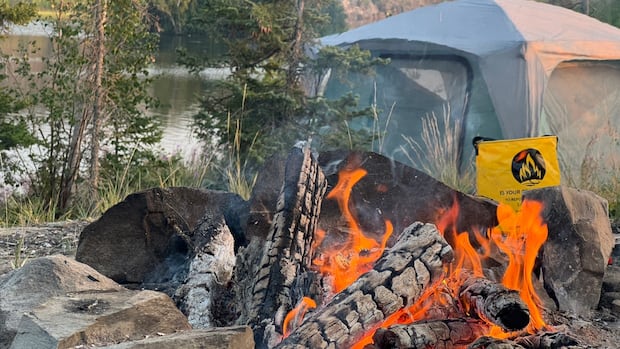The N.W.T. Fire department has reported no charges filed for fire-related offenses in the current year or in 2024.
The forest management agency in the territory emphasized their focus on educating individuals rather than resorting to charging them. This strategy is driven by the relatively low incidence of human-caused wildfires in the area compared to other regions.
Human-caused wildfires are those ignited by sources other than lightning, including campfires, vehicles, industrial activities, fireworks, cigarette butts, and arson. Whether a fire is directly caused by a person or by human-related activities, it falls under the category of human-caused fires.
According to data from the Canadian Interagency Forest Fire Centre, 15% of wildfires in N.W.T. were human-caused in 2024, positioning the territory as the second lowest in Canada for person-caused fires, trailing behind Yukon. Nunavut’s data was not included in the comparison.
In contrast, in Ontario, Quebec, Alberta, Saskatchewan, and Newfoundland and Labrador, around 50% of wildfires in 2024 were human-caused. The percentage in the Atlantic provinces was either close to or reached 100%.
Mike Westwick, the wildfire prevention and mitigation manager in the territory, highlighted that the Department of Environment and Climate Change follows an educational policy rather than a reactive enforcement approach. “Focusing on education is crucial to prevent fire incidents from happening in the first place,” Westwick stated, emphasizing the importance of prevention through education.
Westwick also noted that the lower occurrences of person-caused wildfires in N.W.T. can be attributed to the reduced human activity in the region. He mentioned, “If a jurisdiction experiences numerous person-caused fires, it would likely lead to more enforcement actions being taken.”
Enforcement Actions in 2023
Despite the emphasis on education, Westwick acknowledged the significance of enforcement, including laying charges, in addressing fire-related offenses.
He mentioned ongoing investigations by the RCMP into fires, highlighting the complexity and time-consuming nature of such inquiries. An investigation in Fort Good Hope in 2024 was handed over to the RCMP, which later closed the case due to the inability to identify witnesses or suspects for charging.
Moreover, the RCMP charged two individuals under the Forest Protection Act for setting off fireworks during a fire ban in Fort Smith. While charges against one person were dropped, the other individual was convicted.
Legislation and Penalties
Various levels of government utilize different legislative measures to impose fire restrictions, commonly known as fire bans, each with distinct penalties.
For instance, N.W.T. Fire can enforce fire restrictions under the Forest Protection Act. Officials like forest officers, renewable resource officers, or RCMP officers have the authority to investigate offenses, issue warnings, provide education, or lay charges as per the act.
The Forest Protection Act stipulates fines of up to $1,000 and/or imprisonment for a maximum of 30 days for violating fire restrictions. It also grants the territorial government the ability to seek cost recovery in court from individuals found guilty of violating the act.
In territorial parks, fire restrictions are imposed under the Territorial Parks Act. Violating these restrictions can lead to fines of up to $500 or imprisonment for up to 30 days for a first offense, and fines of up to $1,000 or imprisonment for up to six months for subsequent offenses.
Municipalities enforce fire bans through local bylaws. Breaking a fire ban in the City of Yellowknife, for instance, could result in a $200 fine.

The Forest Protection Act also deems it an offense to



